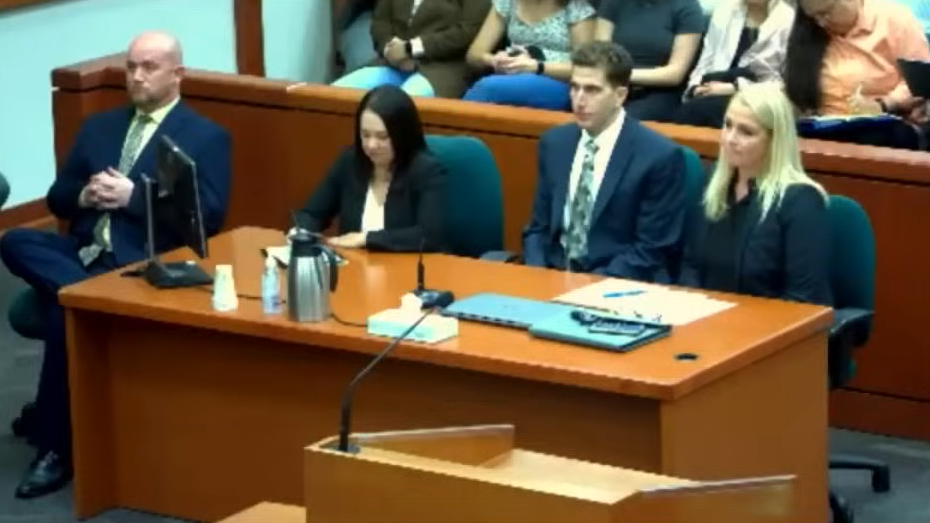BOISE, Idaho — An Ada County judge heard multiple motions in the University of Idaho murder case Wednesday which could shape how the murder trial unfolds.
In the hours long hearing, Judge Steven Hippler heard arguments ranging from language that the prosecution could use and the admissibility of certain evidence.
Inflammatory language and evidence
In the first motion, the defense asked the Judge Steven Hippler to limit what it called “inflammatory” language during the trial such as labeling suspect Bryan Kohberger as a “murderer” or “psychopath.”
In a back and forth with defense attorney Anne Taylor, Judge Hippler said rules are already in place which outline how certain words can be used in a trial as well as “inflammatory” evidence, like photos and videos from the crime scene.
Hippler ruled that the state cannot use the terms “sociopath” or “psychopath” to label Kohberger but can use the term “murder” due to the charges against Kohberger.
Hippler also determined he cannot rule on “inflammatory” evidence as he does not know what that entails at this time but advised both the prosecution and defense to follow proper professional procedures.
Prior ‘bad acts’ evidence
In another motion, the parties discussed how evidence from Amazon and a 2022 traffic stop with Kohberger could be used.
The defense accused the state of using Amazon shopping as evidence outlining how the suspect could have knowledge of cleaning the murder scene.
Judge Hippler told the defense there was a misunderstanding on the defense’s part of the rule they cited to dismiss that evidence. The rule says prior ‘bad acts’ unrelated to the charges could create unfair prejudice against a suspect.
In the same motion, the defense called for video related to an August 2022 traffic stop with Kohberger to be thrown out. The defense claimed the state would use the traffic stop to make a jury prejudicial against Kohberger.
The state said the video would be used to prove Kohberger’s vehicle, identity, and phone number.
Judge Hippler determined the traffic stop can remain as evidence to establish Kohberger’s identity and not as evidence of Kohberger committing ‘bad acts’. Hippler says the video would need to be redacted so jury is only shown the identifying information.
Who can be in the courtroom
In another motion, the state and defense asked for clarification on who can be in the courtroom and testify during the trial, including the victims and Kohberger’s families.
The state and defense argued on how Kohberger’s family could be called to testify.
Judge Hippler did not rule on this motion because he said he needed to read up on the cases the defense cited. He said a written order will be issued at a later time.
Autism diagnosis aggravator
In another motion, the court discussed how an autism diagnosis could impact a potential sentence if Kohberger is convicted.
According to the defense, Kohberger’s diagnosed autism and related behaviors could be used by the state as an aggravator for the death penalty.
The defense asked Judge Hippler for an order limiting the state’s use of Kohberger’s behaviors as aggravating evidence.
Judge Hippler determined he would not issue a broad ruling on autism as an aggravating factor at this time. He did say the state should not use the diagnosis itself as an aggravating factor.
Alternative suspect evidence
In another motion, the state asked the judge to not allow the defense to offer evidence of another specific suspect in the murders. The state says it has concerns of the defense connecting other individuals to the homicides without meeting a threshold of the rules of evidence.
The defense argued it is still in the process of investigating and would not provide evidence that does not meet the standards evidence requires.
Judge Hippler determined a separate hearing date would have to happen for this motion.
Death Penalty
In another motion, the defense referenced Atkins vs. Virginia (executing the intellectually disabled was unconstitutional) for Kohberger’s autism as a mitigation factor to remove the death penalty.
The state asked the judge to deny the defense motion to remove the death penalty because of national consensus. Citing that some states have created a list of mental disabilities that refer to the 8th amendment and mitigation, but no state listed autism spectrum disorder (ASD) in their lists.
Judge Hippler said he would look into the matter before ruling.
DNA evidence
In another motion, the defense raised concerns about evidence related to the knife sheath found at the scene of the murders and found on victims’ fingernails.
Both the defense and state agreed inconclusive evidence found on the victim’s fingernails would not be used to indicate a perpetrator.
In the same motion, the defense asked the terms “touch” and “contact” DNA to not be used by DNA experts. The defense said DNA found on the knife sheath could have been transferred and not indicative of the suspect directly touching the sheath. The defense feels the terms would mislead a jury.
The state argued concerns over limiting what witnesses say, especially if it leads to an accidental violation of a court order and a possible mistrial.
Judge Hippler said the terms are scientific, can be explained to the jury and would not be banned by the court. He did encourage the court to not use the terms as much as they can.
Suspect vehicle evidence
Another motion saw the defense arguing against the use of calling each video instance of a white Hyundai Elantra in the Moscow area, “Suspect vehicle one.”
The defense said it would have to be up to the jury to decide if it is the same vehicle in each instance as opposed to the state telling them.
Judge Hippler said he would release a ruling on this motion at a later time.
Bushy eyebrows descriptor
In another motion, the defense asked the judge to throw out eyewitness testimony where a person in the King Road home described seeing a man with “bushy eyebrows” at the time of the murders.
The defense argued the witness provided an unreliable descriptor due to intoxication and poor visibility. The “bushy eyebrows” descriptor coupled with photos of Kohberger could lead to mistaken identification and would be overly prejudicial, according to the defense.
The state said the witness’s testimony should be included due to the consistency among her multiple interviews and the importance of her being the only person to view the perpetrator.
Judge Hippler did not issue a ruling on this motion.
911 call evidence
The defense also argued for a motion to have a recently released 911 call omitted from evidence.
The defense says the call relies on hearsay and on the effect for whoever hears the call.
The hearsay statements could be admissible through an “excited utterances” exception which the state argued for.
Judge Hippler said much but not all of the 911 call meets the exception but did not make a determination. He said his ruling would come at a later time.
Text message evidence
In a similar motion, the state wanted to admit text records from the time of the murders between the surviving roommates under the same rules of exceptions in hearsay.
King Road house model
The defense and prosecution also argued over the use of a model of the King Road home during the trial. The home was torn down last year.
The prosecution said a model is critical to explaining to jurors what happened during the trial.
The defense raised concerns on the not-to-scale model that may be used and the defense’s lack of access to the model the state would use.
Judge Hippler did not rule on this motion in Wednesday’s hearing. Hippler did explain a housing model would only be used for testimony.
Alibi evidence
In another motion, the state raised questions about Kohberger’s alibi of driving around stargazing. The state said if Kohberger wanted to present an alibi, he would have to testify.
The defense said the state compelling Kohberger to testify would violate his right to remain silent, but Judge Hippler said the alibi would need to be corroborated.
Expert testimony
The prosecution and defense argued over the admissibility of expert testimony on cell phone location data during the trial.
The defense asked the court to limit what the experts can testify on.
Judge Hippler did not rule on this motion.
Amazon click expert
In a similar motion, the prosecution and defense argued over testimony from an expert on Amazon data.
The state would use the click data as evidence of a knife purchased by Kohberger.
The defense accused the state of not properly disclosing the expert testimony and claims the data is misleading.
Judge Hippler says he would not allow the state to go beyond the testimony of the data.
Kohberger is accused of killing Ethan Chapin, Madison Mogen, Xana Kernodle, and Kaylee Goncalves in November 2022. He faces the death penalty if convicted.
COPYRIGHT 2025 BY KXLY. ALL RIGHTS RESERVED. THIS MATERIAL MAY NOT BE PUBLISHED, BROADCAST, REWRITTEN OR REDISTRIBUTED.


